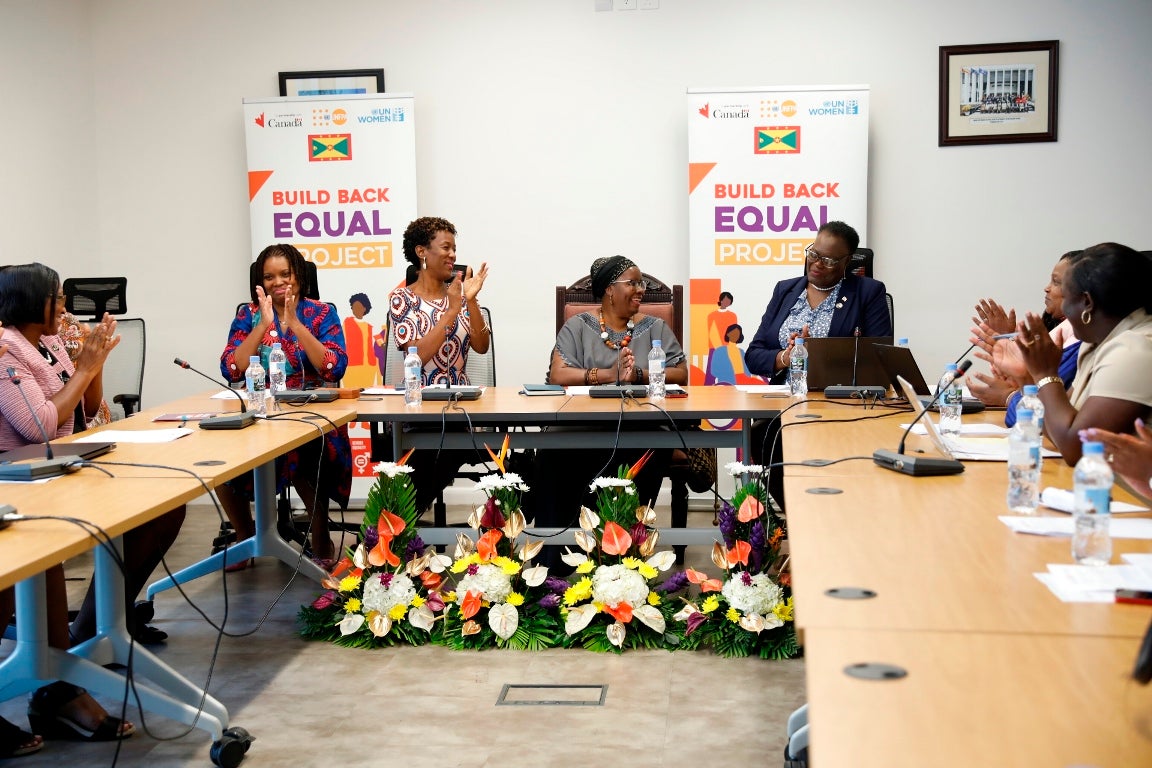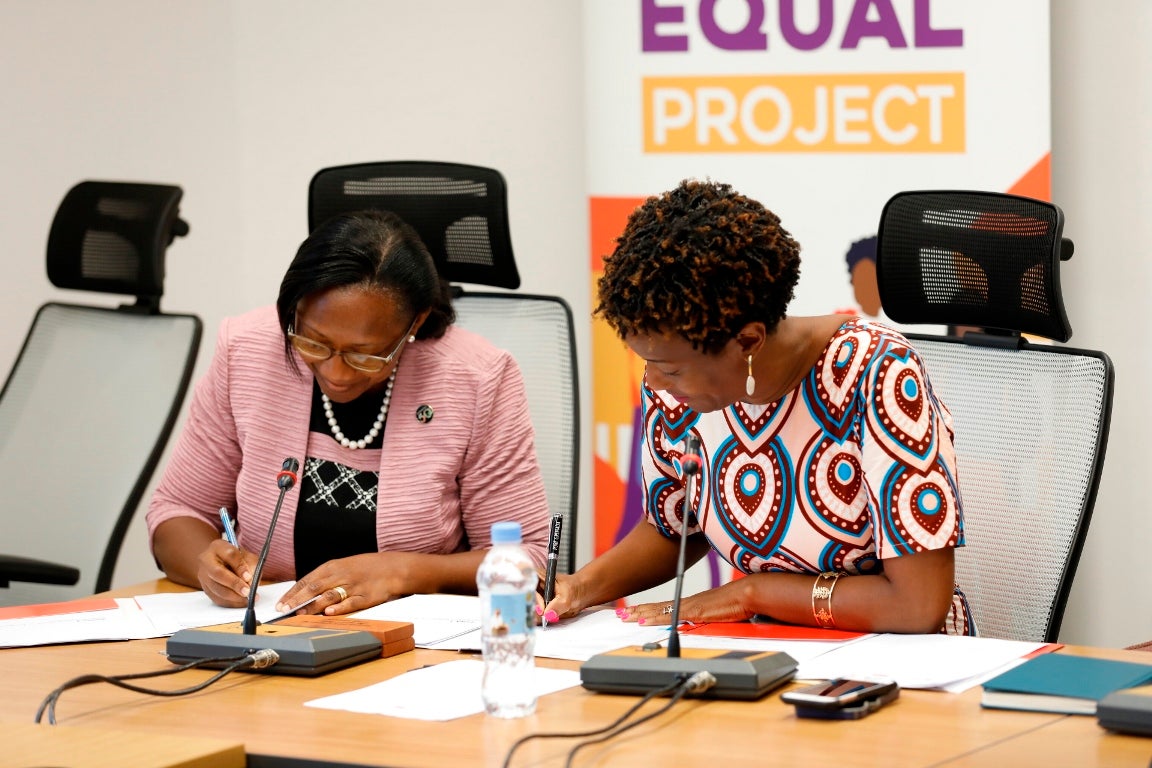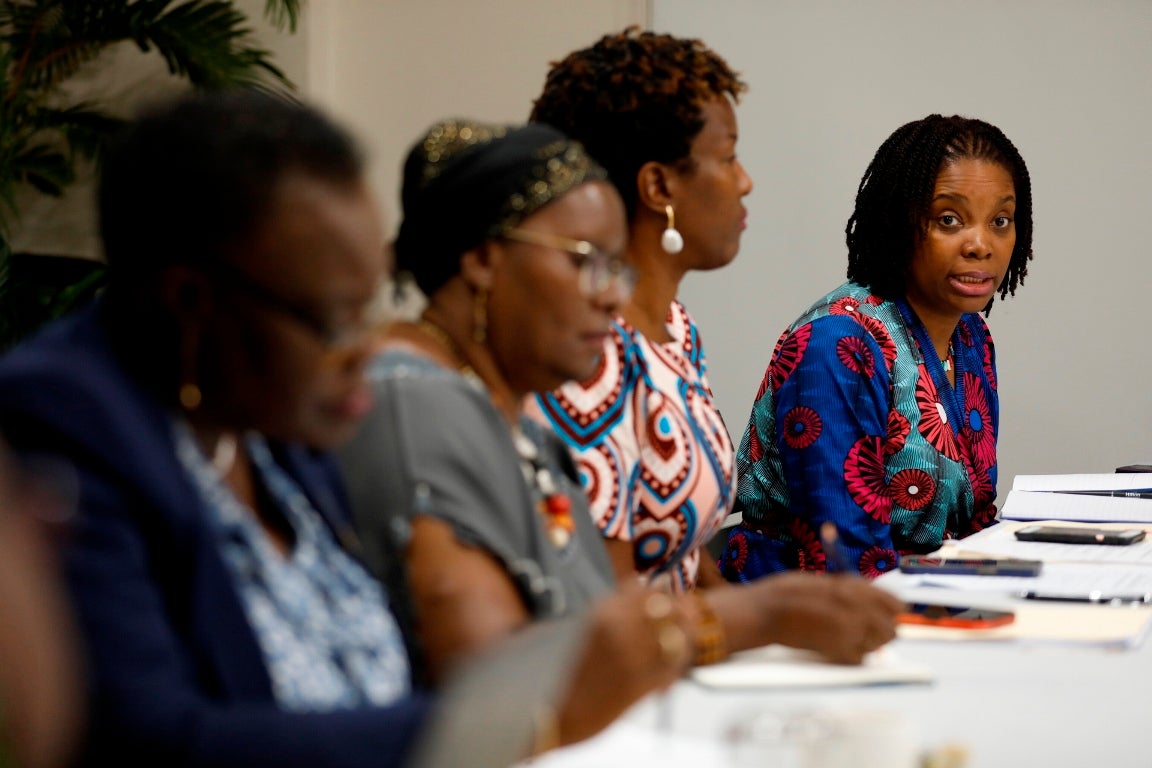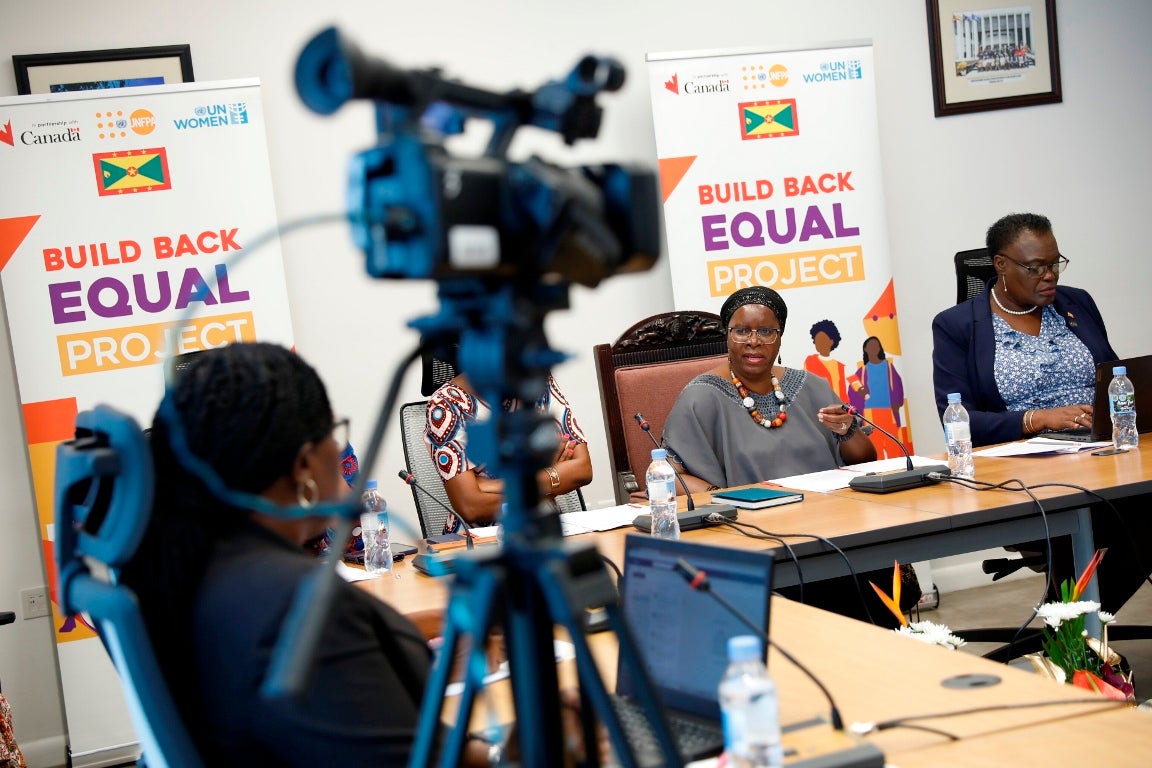Grenada Launches Social Protection Partnership with UN Women
Date:
St. George’s, Grenada - UN Women Multi-Country Office – Caribbean and the Government of Grenada, launched a partnership, which aims to implement a series of Gender-Responsive Social Protection initiatives to accelerate the progress of Sustainable Development Goal 5 (SDG5 5): "Achieve Gender Equality and Empower All Women and Girls” in Grenada.

Isiuwa Iyahen- Deputy Representative, UN Women MCO - Caribbean; Tonni Brodber- Representative, UN Women MCO - Caribbean; Nyaradzayi Gumbonzvanda - Deputy Executive Director, UN Women; and The Honourable Minister Gloria Ann Thomas, Minister in the Ministry of Social and Community Development, Housing and Gender Affairs. Photo: UN Women/Ryan Brown
UN Women will provide technical and financial support, aimed at strengthening various systems including the country’s legal framework to address gender-gaps in legislation and social protection framework, such as developing national policy and legislative reform to the Employment Act and Labour Relations Act (Labour Code) with regard to maternity leave, paternity leave and/or parental leave, and address other gender gaps related to care. The partnership also introduces a pilot initiative, which will explore priority access to services for SEED beneficiaries with child-care responsibilities. This activity will be implemented with the Ministry of Social Development.
The launch of this partnership is a significant milestone in the Government of Canada supported Build Back Equal (BBE) Programme in Grenada. The BBE programme, led by UN Women and jointly implemented with the United Nations Population Fund (UNFPA).
The Honourable Minister Gloria Ann Thomas, Minister in the Ministry of Social and Community Development, Housing and Gender Affairs delivered the feature address saying: “In our experience, events at different stages in life, like childbearing, and illness or disability of a member of the family, produce distinct risks and vulnerabilities for women and girls, who also face specific challenges in relation to gender-based violence. We are grateful for the support that UN Women will provide to assist us in confronting these issues and addressing the entrenched gender inequalities and norms that drive differences in women and men’s lives and their well-being.”

Ceremonial Signing between UN Women and the Grenada Central Statistics Office. (L-R) : Permanent Secretary Merina Jessamy, Ministry of Economic Development, Planning, Agriculture and Lands, Forestry, Marine Resource and Cooperatives; and Tonni Brodber, Representative, UN Women Multi-Country Office – Caribbean. Photo: UN Women/Ryan Brown
During the launch, a Ceremonial Signing took place between UN Women and the Grenada Central Statistics Office. This agreement solidifies UN Women's commitment to assist the Statistics Office in data collection, enabling the Grenada Government to report on SDG Indicator 5.4.1, focusing on "Proportion of time spent on unpaid domestic and care work, by sex, age, and location".
The agreement was signed by Tonni Brodber, Representative, UN Women Multi-Country Office – Caribbean, and Merina Jessamy — Permanent Secretary with responsibility for Economic Development, Planning and Cooperatives, Ministry of Economic Development, Planning, Agriculture and Lands, Forestry, Marine Resource and Cooperatives.

(Far right) Isiuwa Iyahen, Deputy Representative, UN Women MCO – Caribbean delivers a point during the launch.
Photo: UN Women/Ryan Brown.
Speaking on unpaid domestic and care work, Isiuwa Iyahen, Deputy Representative from UN Women MCO – Caribbean said: “To make this work visible, we have to measure it, we have to recognise it; we have to value it as the invaluable work that it is […] Reducing unpaid care work can reduce income poverty. For example, women who are recipients of public assistance with child-care responsibilities could have more time to pursue adult education, to pursue job and skills training, and to invest more time to attend to their own health, including mental health.”
Delivering the call to action at the launch was Ms. Nyaradzayi Gumbonzvanda- Deputy Executive Director for Normative Support, United Nations System Coordination and Programme Results at the United Nations Entity for Gender Equality and the Empowerment of Women (UN Women), said: “The data continues to show a gender wage gap, while not available for all countries, confirms that women are more likely than men to work lower waged jobs because you have to put food on the table so at times you accept what comes your way. Often, without social protection, despite shouldering a disproportionate burden of unpaid care is women’s attempt to balance demands of their productive and reproductive roles […] poverty is an accentuated impact on women.”

Ms. Nyaradzayi Gumbonzvanda- Deputy Executive Director for Normative Support, United Nations System Coordination and Programme Results, UN Women delivers the ‘Call to Action’. Photo: UN Women/Ryan Brown
The programme, “Build Back Equal” (BBE), is being implemented from 2022 to 2025. It will contribute to women’s economic resilience by taking a comprehensive approach to addressing the barriers to economic empowerment that women face and supporting the participating countries to provide increased sustainable opportunities for women’s economic growth. The project’s overall theory of change is that if women in Dominica, Grenada, St. Lucia and St. Vincent and the Grenadines, especially the most marginalized, have increased access to subsidised childcare, reliable sexual and reproductive health services, to climate and shock-responsive social protection which includes gender-based violence services and opportunities for and access to innovative financing, digitization and climate-smart and environmentally-friendly practices to grow their businesses; then they will experience economic resilience and their countries will benefit from their increased productivity to Build Forward Equal.
For more information about UN Women and its work, please visit https://caribbean.unwomen.org.
Media Contact: [ Click to reveal ]